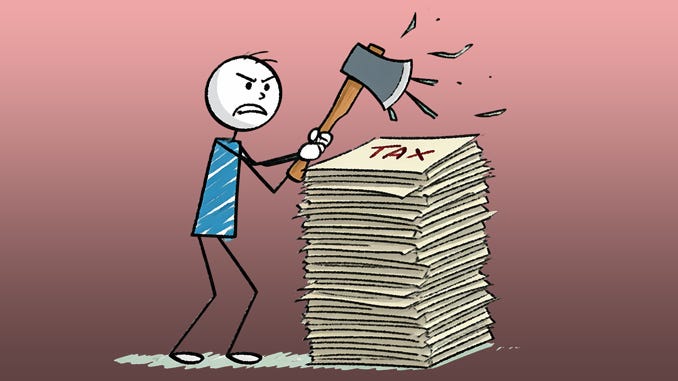Wanderings – Hide the axes, keep some taxes
There is a lot of rhetoric out in the political space about axing taxes. Carbon taxes, income taxes, this tax, that tax; all the taxes will be axed. What happens to services and programs Canadians rely on, if the taxes that fund them are axed?
When a government cuts taxes. those are cuts in revenue that must be made up somehow. The argument made by the political right is that if taxes are cut, business will flourish. That will generate more revenue at lower tax rate, but in increased volume. That is not always the case.
When a business increases its revenues, it also increases the number of write-offs to offset that revenue. In theory, that should still mean incrementally more tax money heading to Ottawa. Except it does not. Canada’s corporate tax rate decreased a few years ago at the same time as top companies saw profit margins increase. That effectively created an increasing gulf in taxes that should have been collected that were not.
Another way to fund those axing of taxes is through debt; borrowing more on the governmental credit cards to pay for services. No government is immune to using the ol’ Visa when times are tough.
There is no shame in dipping into the rainy day fund when in need. Even former conservative Prime Ministers Brian Mulroney and Stephen Harper did it while racking up record-setting deficits. The only time that there has been real work to try to clean up the books was when Paul Martin was Finance Minister in the 1990s. Otherwise it has been varying degrees of spend, spend, spend – and worry about the debt later.
When the money runs out and the jig is up, axing taxes means axing programs. When that happens, you have to ask what programs are governments willing to cut – and why? You have to keep asking this, because no political leader who wants to axe taxes is willing to give a straight answer on what will be cut.
A further cut to the corporate tax rate to below 15 per cent will make the country very appealing to foreign investment capital. But will that create jobs, and trickle in more tax revenue through volume? No. That action will make large companies more profitable and further increase the gulf in taxes.
A big tax that some want to axe is Canada’s carbon tax, with claims that it makes life more expensive for everyone. Does it?
The Parliamentary Budget Office recently reported that more than half of all Canadians are further ahead with the carbon tax and subsequent rebates than those without. There are some less tangible issues like the cost of transportation due to carbon taxes on fuel making groceries more expensive. Perhaps, but cutting the carbon tax is not going to give Canadians a cut on their grocery bills because – corporate greed.
Remember when Ontario Premier Doug Ford decreased the provincial portion of gas taxes to help people’s wallets? That tax reduction was not seen as gas prices were unchanged – corporations sopped up the extra money.
For 40-plus years, Canadian governments have tried to keep up with the US Republican, Ronald Reagan trickle-down economics train, where taxes are not just bad, but evil. Canadians, whose government services are more in line with European and other nations, want all these services like health care etc. In trying to have it both ways – paying less tax, and getting government to do so much – the result is not often not fiscally compatible.
European countries are often criticized for high personal and business taxes. Germany for example has a top income tax rate of 45 per cent whereas Canada has a top rate of 33 per cent. Adding in various provincial rates, it can push Canadians above the 50 per cent mark for those on the top bracket. Our government collects more as a percentage than many European countries and does less.
American writer Albert Bushnell Hart once said, “Taxation is the price which civilized communities pay for the opportunity of remaining civilized.”
Having publicly-funded medicare, the start of a prescription drug program and dental care are all positives to support our civilized communities. They are as important as having roads to drive to work on or schools to educate our kids in.
Axing taxes has a cost, so who pays for it? We do either way. Axing the tax, axes the programs we need and want, increasing negative outcomes. What good are lower taxes if you can’t afford medication?
The best outcome for Canadians when it comes to taxes and government services, is to have government be as vigilant as possible to ensure every dollar collected and spent is spent wisely. If there is waste or mismanagement, then that should be addressed. Those are the examinations that you use a scalpel to address, not an axe.
This column was originally published in the October 16, 2024 print edition of the Morrisburg Leader. Read this column on my website at https://phillip.blancher.ca/2024/10/16/hide-the-axes-keep-some-taxes/
A bonus for Substack subscribers – help pick next week’s topic!



